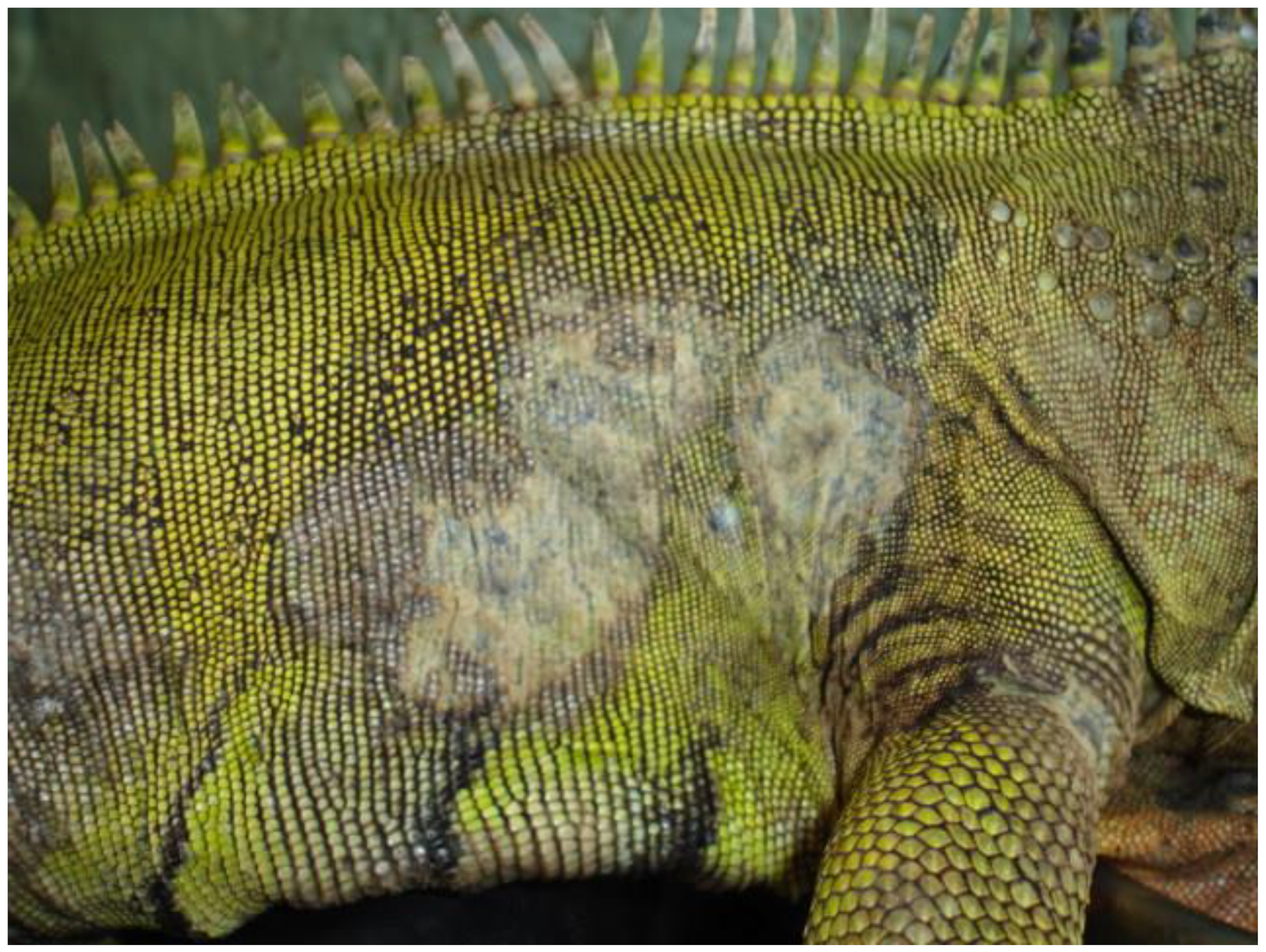Reptiles can suffer from common illnesses such as respiratory infections, metabolic bone disease, and parasites. Treatments include antibiotics, calcium supplements, and antiparasitic medications.
Reptiles make fascinating and unique pets, but like all animals, they are susceptible to illnesses. Understanding some of the most common health issues that affect reptiles is crucial for ensuring their well-being. Respiratory infections, commonly caused by poor husbandry, can lead to breathing difficulties and should be treated with antibiotics.
Metabolic bone disease, often due to calcium deficiency, requires supplementation and a well-balanced diet. Additionally, parasites such as mites and ticks can be effectively removed with antiparasitic medications. By familiarizing yourself with these common reptile illnesses and their treatments, you can better care for your scaly companions and keep them healthy and happy.

Credit: www.mdpi.com
The Importance Of Treating Reptile Illnesses
Identification Of Common Reptile Illnesses
Reptiles, like any other living beings, are susceptible to various illnesses. Identifying common reptile illnesses is crucial in ensuring their well-being. Some common reptile illnesses include respiratory infections, metabolic bone disease, mouth rot, and parasitic infections.
Understanding The Consequences Of Untreated Illnesses
Untreated reptile illnesses can lead to severe consequences. Respiratory infections, for example, can progress to pneumonia, while metabolic bone disease can cause deformities and fractures. Mouth rot can become systemic, affecting the entire body, and parasitic infections can lead to malnutrition and anemia.

Credit: www.amazon.com
Preventative Measures For Reptile Health
Reptiles are unique creatures that require specific care to prevent illness and promote their overall well-being. By implementing preventative measures, reptile owners can maintain a healthy habitat and ensure proper nutrition, reducing the risk of common reptile illnesses. Here are essential guidelines for creating a healthy environment and providing adequate nutrition for your reptile companions.
Creating A Healthy Habitat
Properly maintaining the enclosure is crucial for the overall health of your reptile. Consider the following factors to create an optimal habitat: suitable temperature, humidity levels, lighting, and substrate. Regularly clean and disinfect the habitat to minimize the risk of bacterial or fungal infections. Additionally, providing adequate space and environmental enrichment contributes to the mental and physical well-being of your reptile.
Maintaining Proper Nutrition
A well-balanced and species-appropriate diet is vital for the overall health of your reptile. Ensure that your pet receives nutrient-rich foods, including live prey, fresh fruits, and vegetables. Supplement their diet with essential vitamins and minerals to prevent nutritional deficiencies that can lead to health issues. Monitoring food intake and providing clean water at all times are essential aspects of maintaining proper nutrition for your reptile.
Common Reptile Illnesses And Their Treatments
Reptiles can make fascinating and unique pets, but just like any other animal, they can also fall ill. It’s important for reptile owners to be aware of common illnesses and their treatments to ensure the well-being of their scaly companions. In this article, we will explore three common reptile illnesses: respiratory infections, parasitic infestations, and metabolic bone disease. Let’s delve into the symptoms, identification, causes, and effective treatments for each of these conditions.
Respiratory Infections: Symptoms And Treatments
A respiratory infection can take a toll on a reptile’s health, affecting the upper or lower respiratory system. Some common symptoms of respiratory infections in reptiles include:
- Nasal discharge
- Lethargy
- Loss of appetite
- Open-mouth breathing
- Frequent or excessive coughing or sneezing
If you notice any of these symptoms in your reptile, it’s crucial to seek veterinary care promptly. Proper diagnosis is essential to determine the exact cause and severity of the infection, as treatment may vary. Depending on the severity, your veterinarian may prescribe antibiotics or other medications to help fight the infection. It’s also important to ensure your reptile’s enclosure has optimal humidity and temperature levels, as environmental factors can play a role in respiratory health.
Parasitic Infestations: Identification And Treatment
Parasitic infestations are another common health issue faced by reptiles. These can include external parasites like mites or ticks, as well as internal parasites such as worms or protozoa. It’s essential to be aware of the signs of parasitic infestations in reptiles, which can include:
- Visible parasites on the skin or in the feces
- Weight loss or poor growth
- Loss of appetite
- Lethargy
- Changes in behavior or appearance
If you suspect your reptile may have a parasitic infestation, it’s crucial to consult with a veterinarian experienced in reptile care. They will perform a thorough examination and may recommend specific tests to identify the type of parasite involved. Treatment options can vary depending on the parasite, but often include the use of deworming medications, topical treatments, or environmental modifications to reduce the risk of re-infestation.
Metabolic Bone Disease: Causes And Treatment
Metabolic bone disease is a condition commonly seen in reptiles, particularly those with inadequate calcium and vitamin D3 levels. This disease affects the reptile’s bone development and can lead to deformities, fractures, and weakness. The causes of metabolic bone disease can include:
- Poor diet lacking essential nutrients
- Inadequate exposure to proper UVB lighting
- Incorrect calcium to phosphorus ratio in the diet
If you suspect your reptile may be suffering from metabolic bone disease, it’s crucial to seek veterinary care. The veterinarian will evaluate the reptile’s overall health, conduct blood tests, and may recommend imaging such as X-rays to assess bone health. Treatment may involve dietary adjustments, the administration of calcium and vitamin D3 supplements, and ensuring proper UVB lighting is provided. It’s essential to address the underlying causes of metabolic bone disease to prevent further complications and promote healthy bone development in reptiles.
Seeking Professional Help: Finding A Reptile Veterinarian
If you own a reptile, ensuring its health and well-being is one of your top priorities. Just like any other pet, reptiles can also get sick. As a responsible reptile owner, it’s essential to have a trusted reptile veterinarian to turn to when your scaly friend needs medical attention. Finding a reptile veterinarian may seem daunting, but with the right research and asking the right questions, you can find a knowledgeable and experienced professional to provide the best care for your reptile.
Researching Reptile Veterinarians
When it comes to researching reptile veterinarians in your area, you should focus on finding someone specialized in treating reptiles. Not all veterinarians have experience or knowledge about reptile healthcare, so it’s crucial to seek out professionals who have expertise in this specific field.
Here are a few tips to help you research and find the perfect reptile veterinarian:
- Start by checking reputable online sources such as veterinary association websites or directories that list reptile specialists in your area.
- Read reviews and testimonials from fellow reptile owners. Their experiences can give you insights into the quality of care provided by different veterinarians.
- Ask for recommendations from other reptile owners, local pet stores, or reptile-specific forums and groups online. Peer recommendations can help you find veterinarians who have a good reputation in the reptile community.
- Consider their experience and qualifications. Look for veterinarians who have received additional training or certification in exotic animal medicine.
Remember that your reptile’s health is at stake, so take the time to thoroughly research and find a reptile veterinarian who can provide the specialized care your pet needs.
Questions To Ask When Choosing A Reptile Veterinarian
Once you have narrowed down your list of potential reptile veterinarians, it’s time to reach out and gather more information. Asking the right questions will help you determine if a particular veterinarian is the right fit for your reptile. Here are some questions to consider:
- What is your experience and specialization in reptile medicine?
- Do you have any specific reptile-related certifications or training?
- What are your office hours, and do you offer emergency services?
- What types of reptiles do you typically treat?
- What diagnostic and treatment equipment do you have in your practice?
- How do you handle anesthesia and surgery for reptiles?
- What is the estimated cost for a typical visit or specific treatments?
- Do you offer any preventive care services for reptiles?
These questions will help you gauge the veterinarian’s knowledge, experience, and level of care they provide for reptiles. Don’t be afraid to ask questions and get as much information as possible to make an informed decision when choosing a reptile veterinarian.
Home Care For Sick Reptiles
When a reptile becomes sick, proper home care becomes crucial for its recovery. Providing a stress-free environment, administering medication and care, and monitoring and recording the reptile’s progress are essential steps in ensuring their well-being. Let’s delve into these aspects in more detail:
Providing A Stress-free Environment
Reptiles are sensitive creatures, and a stressed environment can worsen their condition. To create a stress-free space, consider the following:
- Ensure their enclosure is clean and well-maintained.
- Keep the temperature and humidity levels within the reptile’s preferred range.
- Provide hiding places and comfortable substrates to make them feel secure.
- Minimize disturbances and loud noises in their surroundings.
A stress-free environment encourages healing and helps the reptile regain its strength.
Administering Medication And Care
Proper administration of medication and care is vital in treating a sick reptile. Here are some key pointers:
- Follow the veterinarian’s instructions: Ensure you understand the dosage, frequency, and method of administration for any prescribed medication.
- Handle with care: When handling a sick reptile, ensure you support their body properly to avoid causing additional stress or injury.
- Proper feeding: Ensure the reptile receives the necessary nutrients by providing food that is easy for them to consume, especially if their appetite is reduced.
- Hydration: Keep a close eye on their water intake and provide fresh, clean water at all times.
- Pain management: If the reptile is experiencing pain, consult the veterinarian for suitable pain relief options.
Monitoring And Recording The Reptile’s Progress
Monitoring the reptile’s progress is essential for assessing the effectiveness of the treatment and making any necessary adjustments. Here’s what you can do:
- Observe behavior: Pay attention to any changes in the reptile’s behavior, appetite, or appearance.
- Record any symptoms: Keep a record of any symptoms or notable occurrences, such as shedding, regurgitation, or changes in waste.
- Take notes during veterinarian visits: Jot down any advice, instructions, or recommendations provided by the veterinarian during check-ups.
- Regular communication with the veterinarian: Share your observations and progress updates with the veterinarian to ensure they have a complete picture of the reptile’s condition.
By closely monitoring and recording the reptile’s progress, you can collaborate effectively with the veterinarian and provide the best care possible.

Credit: www.amazon.com
Frequently Asked Questions On Common Reptile Illnesses And Their Treatments
What Is The Most Common Disease In Reptiles?
The most common disease in reptiles is respiratory infections, often caused by poor husbandry or stress. Proper care and housing can help prevent this. Regular veterinary check-ups are also important to maintain the health of pet reptiles.
How Do You Treat An Infected Reptile?
To treat an infected reptile, consult a reptile veterinarian for proper diagnosis and medication. Keep the reptile in a clean and warm environment, provide proper nutrition, and administer antibiotics as prescribed. Regularly monitor the reptile’s condition and follow the veterinarian’s instructions for a full recovery.
What Do You Do With Reptiles You No Longer Want?
If you no longer want your reptile, you can consider different options. You can try to find it a new home by reaching out to local reptile enthusiasts or rescue organizations. Alternatively, you could contact a zoo or educational facility to see if they can take it in.
Remember to never release a reptile into the wild.
What Antibiotics Are Used For Reptiles?
Common antibiotics used for reptiles include enrofloxacin, ciprofloxacin, doxycycline, and trimethoprim/sulfa. These medications are effective in treating bacterial infections in reptiles.
Conclusion
To keep your reptilian friends healthy, it is important to be aware of common illnesses they may encounter. By recognizing symptoms early on and seeking proper treatment, you can ensure their well-being and longevity. Regular check-ups with a veterinarian who specializes in reptiles are vital for early detection and effective treatment.
Remember, prevention is always better than cure, so providing a clean and suitable environment for your reptile is key. With these precautions and necessary treatments, you can provide the best care for your scaly companions.




